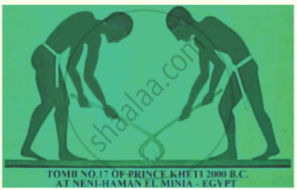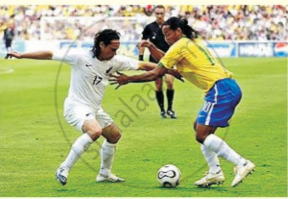Advertisements
Advertisements
प्रश्न
The word ‘tip’ has only three letters but many meanings.
Match the word with its meanings below.
- finger tips – be about to say something
- the tip of your nose – make the boat overturn
- tip the water out of the bucket – the ends of one’s fingers
- have something on the tip of your tongue – give a rupee to him, to thank him
- tip the boat over-empty a bucket by tilting it
- tip him a rupee-the pointed end of your nose
- the tip of the bat – if you take this advice
- the police were tipped off – the bat lightly touched the ball
- if you take my tip – the end of the bat
- the bat tipped the ball – the police were told or warned
उत्तर
- Finger tips – the ends of one’s fingers
- The tip of your nose – the pointed end of your nose
- Tip the water out of the bucket – empty a bucket by tilting it
- Have something on the tip of your tongue – be about to say something
- Tip the boat over – make the boat overturn
- Tip him a rupee – give a rupee to him to thank him
- The tip of the bat – the end of the bat
- The police were tipped off – the police were told or warned
- If you take my tip – if you take my advice
- The bat tipped the ball – the bat lightly touched the ball
APPEARS IN
संबंधित प्रश्न
Look at these words:
...peace comes dropping slow
Dropping from the veils of the morning to where the cricket sings
What do these words mean to you? What do you think “comes dropping slow...from the veils of the morning”? What does “to where the cricket sings” mean?
Read and enjoy :
Hockey 
Do you know when hockey was first played? Research in Ethiopia has discovered that it has been around for more than four millenia. A tablet in Greece has images of young people playing field hockey. Even in South America, Ireland, Egypt, Scotland and Rome, there are proofs and records of this game. The game in these countries was no different than the other even though it was known by different names. Hundreds of years ago, this game was known as 'Hockie' in Ireland and it is this name that has stuck with the game ever since.

While current field hockey appeared in the mid-18th century in England, primarily in schools, it was not until the first half of the 19th century that it became firmly established. Prior to 1980, women were not permitted to take part in this game. The first club was created in 1849 at Blackheath in south-east London. During the 1600s and 1700s, hockey in England was a little dissimilar and it was more disorganised. People from all over the village would take part in the game. It was not unusual for a team to have 60 - 100 players. It was the goal of the team players to get the ball into the common ground of the rival team. This game required quite a few days to finish. Many players suffered injuries. Even though umpires were present, they were not allowed to say anything without the team members' request.
Ultimaty , good judgment prevailed. Firm regulations were introduced. In England, a headmaster restricted the number of players to thirty for one single team, During the 1860s, England's Eton College laid down some rules for the game. Additional rules were introduced afterthe formation of the Hockey Association in the year 1875.
Football
Football refers to a number of similar team sports, all of which involve (to varying degrees) kicking a ball with the foot in an attempt to score a goal. People from around the world have played games which involved kicking and / or canying a ball, since ancient times. However, most of the modern codes of football have their origins in England.

The most popular of these sports worldwide is association football, more comm.only known as just 'Football' or 'Soccer'. It is widely considered to be the most popular sport in the world
We will ponder your proposition and when we decide we will let you know. But should we accept it, I here and now make this condition that we will not be denied the privilege without molestation of visiting at any time the tombs of our ancestors, friends, and children. Every part of this soil is sacred in the estimation of my people. Every hillside, every valley, every plain and grove, has been hallowed by some sad or happy event in days long vanished. Even the rocks, which seem to be dumb and dead as the swelter in the sun along the silent shore, thrill with memories of stirring events connected with the lives of my people, and the very dust upon which you now stand responds more lovingly to their footsteps than yours, because it is rich with the blood of our ancestors, and our bare feet are conscious of the sympathetic touch. Our departed braves, fond mothers, glad, happy hearted maidens, and even the little children who lived here and rejoiced here for a brief season, will love these somber solitudes and at eventide they greet shadowy returning spirits. And when the last Red Man shall have perished, and the memory of my tribe shall have become a myth among the White Men, these shores will swarm with the invisible dead of my tribe^ and when your children’s children think themselves alone in the field, the store, the shop, upon the highway, or in the silence of the pathless woods, they will not be alone. In all the earth there is no place dedicated to solitude. At night when the streets of your cities and villages are silent and you think them deserted, they will throng with the returning hosts’that once filled them and still lover this beautiful land. The White Man will never be alone.
Let him be just and deal kindly with my people, for the dead are not powerless. Dead, did I say? There is no death, only a change of worlds.
Read the extract given below and answer the question that follow.
How is every part of the soil sacred to his people?
He looked at me very blankly and tiredly, and then said, having to share his worry with someone, “The cat will be all right, I am sure. There is no need to be unquiet about the cat. But the others. Now what do you think about the others?”
“Why they’ll probably come through it all right.”
“You think so?”
“Why not,” I said, watching the far bank where now there were no carts.
“But what will they do under the artillery when I was told to leave because of the artillery?”
“Did you leave the dove cage unlocked?” I asked.
“Yes.”
“Then they’ll fly.”
“Yes, certainly they’ll fly. But the others. It’s better not to think about the others,” he said.
Read the extract given below and answer the question that follow.
Which animal is the old man least concerned about?
Mr. Oliver, an Anglo-Indian teacher, was returning to his school late one night on the outskirts of the hill station of Shimla. The school was conducted on English public school lines and the boys – most of them from well-to-do Indian families – wore blazers, caps and ties. “Life” magazine, in a feature on India, had once called this school the Eton of the East.
Mr. Oliver had been teaching in this school for several years. He’s no longer there. The Shimla Bazaar, with its cinemas and restaurants, was about two miles from the school; and Mr. Oliver, a bachelor, usually strolled into the town in the evening returning after dark, when he would take short cut through a pine forest.
Read the extract given below and answer the question that follow.
What did Mr Oliver generally do in the evening?
Read the extract given below and answer the questions that follow:
Where the mind is without fear and the head is held high
Where knowledge is free
Where the world has not been broken up into fragments
By narrow domestic walls (Where the Mind is Without Fear: Rabindranath Tagore)
(i) To whom is the poet praying? Whose mind is the poet referring to at the beginning of the poem? Why?
(ii) In which situation is the lead held high? What does he mean by 'knowledge is free'? What are 'narrow domestic walls'?
(iii) What does the poet mean by 'tireless striving'? What does 'clear stream' refer to? Explain.
(iv) What is meant by 'dead habit'? What is 'dead habits' compared to and why?
(v) What does ti» poet wish for al the end ~f the poem? What does tl1e poem tell the readers about the poet? Give a reason to justify yow· answer.
Read the extract given below and answer the questions that follow :
Duke: You hear the team’d Bellario, what he writes:
And here, I take it, is the doctor come.
[Enter Portia, dressed like a Doctor of Laws]
Give me your hand. Come you from old Bellario”?
Portia: I did, my lord.
Duke: You are welcome : take your place.
Are you acquainted with the difference
That holds this present question in the court?
(i) Where is this scene set? Why was Portia there?
(ii) What reason had Bellario given for his absence? Whom had he sent in this stead?
(iii) Bellario's letter stated that he had taken some measures to prepare the 'young and learned doctor' to deal with the case. What were they?
(iv) What was the 'difference' between Shylock the Jew and Antonio the merchant that the Duke was unable to resolve?
(v) How does Portia succeed in saving Antonio? What does this reveal of her character?
Abbu Khan said, “No more goats in my house ever again.” Then he changed his mind. Why?
How did the king promise to reward the person who would answer his questions correctly?
Mr Gessler was spending his days with great difficulty. Give suitable arguments in favour of this.
What impressed the king when he spent a night in the cave?
What was it that made Prem leave his village?
What is the story’s underlying message or advice to the readers? Do you also support the author’s view?
Vijay Singh complained of insects in the cave. What was he referring to, and why?
Read the lines in which the following phrases occur. Then discuss with your partner the meaning of each phrase in its context.
meadow houses
What does the child think about his/her teacher?
What are some of the notable features told about snakes in the lesson?
Replace the italicised portion of the sentence below with a suitable phrase from the box. Make necessary changes, wherever required.
He has been told not to take risks while driving a car through a crowded street.
Study the following phrases and their meanings. Use them appropriately to complete the sentences that follow.
After a very long spell of heat, the weather is ………….. at last.
The words helper, companion, partner and accomplice have very similar meanings, but each word is typically used in certain phrases. Can you fill in the blanks below with the most commonly used words? A dictionary may help you.
I’m mother’s little ………………
